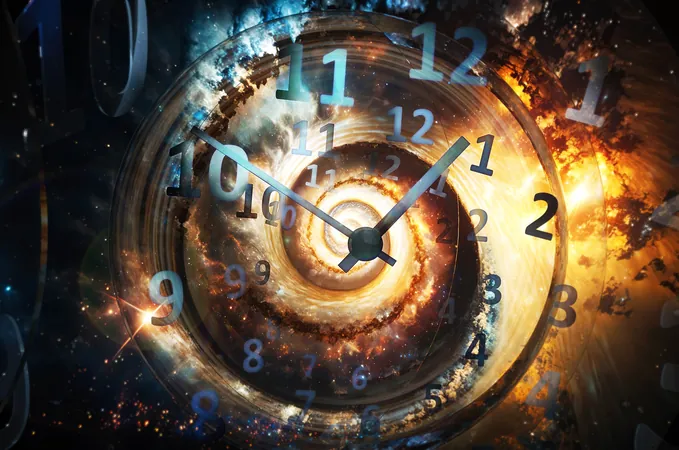
Time May Be an Illusion: What Cutting-Edge Physicists Are Discovering About Our Experience of Time
2025-01-12
Author: Kai
Time May Be an Illusion: What Cutting-Edge Physicists Are Discovering About Our Experience of Time
Time is so ingrained in our daily lives that we often take its passage for granted. Clocks tick, days pass, and we align events in a neat sequence. However, a growing body of research in theoretical physics suggests that the concept of time, as we understand it, might not be as straightforward as it seems.
Recent discussions among physicists challenge the very foundation of our perception of time. Some assert that time may not exist in any definitive or fundamental way and that our understanding of a flowing "now" could simply be a construct of human perception.
The Illusion of Time in Everyday Life
Our lives are structured around the clear demarcation of past, present, and future. We meet deadlines, schedule tasks, and even set alarms to manage our daily routines. Yet, statements like, "The equations of physics do not tell us which events are occurring right now," can unsettle even the most seasoned scientists.
This paradox highlights a significant difference between our intuitive sense of time and the way modern physics describes it. For example, Dr. Carlo Rovelli, a prominent theorist in the field, has explored loop quantum gravity and argued that a global time parameter may not be necessary to explain the universe.
Einstein's Revolutionary Impact
The theories posited by Albert Einstein, particularly his relativity theories, transformed our perception of time. His special theory of relativity introduced the idea that time is not a universal constant; it fluctuates depending on one's speed or proximity to massive objects. This phenomenon, known as "time dilation," has been observed and confirmed through numerous experiments involving fast-moving particles and even GPS technology.
In Einstein's general theory of relativity, he went further, illustrating how gravitational fields can significantly affect the passage of time. The closer you are to a massive object, the slower time moves for you compared to someone farther away.
Quantum Mechanics: A Further Complication
Quantum mechanics adds another layer of complexity to our understanding of time. While traditional physics treats time as an absolute measure, quantum experiments suggest that no single observer can capture a universal "present." As physicists delve into unified theories of quantum gravity, some even attempt to eliminate time altogether from their equations.
For instance, the Wheeler-DeWitt equation famously presents a timeless description of the universe, focusing on correlations between physical states rather than an evolutionary timeline of events.
The Arrow of Time and Entropy
Despite the philosophical conundrums around the nature of time, we perceive a clear directionality in our experiences: we see eggs break rather than unbreak, and coffee mixes with milk instead of separating. This sense of a forward momentum is closely linked to the concept of entropy, a measure of disorder in a system.
The second law of thermodynamics states that entropy in an isolated system invariably increases over time. This principle explains why we perceive time as moving from the past to the future—a concept often referred to as the "arrow of time." The universe began in a low-entropy state, with processes evolving toward disorder, shaping our understanding of chronological flow.
The Future of Our Understanding of Time
Some scholars speculate that our perception of time may eventually be deemed akin to a devised accounting system, rather than a fundamental aspect of reality. Nonetheless, humans continue to live as if each moment holds significance. We structure our lives around the ticking of clocks, the passing of days, and the anticipation of tomorrow.
As we navigate our routines, whether time is an illusion, a result of thermodynamic processes, or an emergent characteristic of deeper physical laws, one question looms large: Why are we so attached to the perception of time as a flowing entity?
Will advancements in science and psychology allow us to unravel the true nature of time? Only time will reveal what lies ahead.
This exploration of time offers a profound glimpse into the mysteries of our universe—mysteries that beckon us to rethink not just how we measure time, but how we experience reality itself.





 Brasil (PT)
Brasil (PT)
 Canada (EN)
Canada (EN)
 Chile (ES)
Chile (ES)
 Česko (CS)
Česko (CS)
 대한민국 (KO)
대한민국 (KO)
 España (ES)
España (ES)
 France (FR)
France (FR)
 Hong Kong (EN)
Hong Kong (EN)
 Italia (IT)
Italia (IT)
 日本 (JA)
日本 (JA)
 Magyarország (HU)
Magyarország (HU)
 Norge (NO)
Norge (NO)
 Polska (PL)
Polska (PL)
 Schweiz (DE)
Schweiz (DE)
 Singapore (EN)
Singapore (EN)
 Sverige (SV)
Sverige (SV)
 Suomi (FI)
Suomi (FI)
 Türkiye (TR)
Türkiye (TR)
 الإمارات العربية المتحدة (AR)
الإمارات العربية المتحدة (AR)